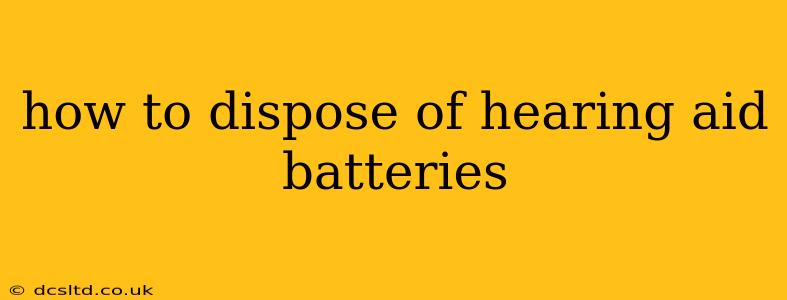Hearing aid batteries, while small, pose a significant environmental concern if not disposed of properly. These tiny powerhouses contain materials like zinc, mercury, and silver oxide, which can leach into the environment and contaminate soil and water if simply tossed in the trash. This guide will walk you through the best and safest ways to dispose of your used hearing aid batteries, ensuring both your safety and the protection of the planet.
What Makes Hearing Aid Battery Disposal Important?
The importance of responsible hearing aid battery disposal stems from the environmental impact of their components. Improper disposal contributes to:
- Soil contamination: Heavy metals like mercury and silver oxide can contaminate soil, harming plant life and potentially entering the food chain.
- Water pollution: Leached materials can pollute waterways, affecting aquatic life and potentially contaminating drinking water sources.
- Air pollution: Incineration of batteries releases harmful fumes into the atmosphere.
How to Dispose of Hearing Aid Batteries Safely:
The best way to dispose of hearing aid batteries is through recycling programs. These programs are designed to recover valuable materials and prevent environmental damage. Here's how you can find and utilize them:
- Check with your local waste management facility: Most municipalities have specific guidelines and programs for battery recycling. Their website or a phone call will provide details on drop-off locations and acceptable battery types.
- Contact your hearing aid provider or audiologist: They often have recycling programs in place or can advise you on local options. Many clinics participate in battery recycling initiatives to ensure responsible waste management.
- Utilize retail drop-off programs: Some retailers, particularly electronics stores, participate in battery recycling programs. Look for designated collection bins in-store.
- Mail-in recycling programs: Some specialized recycling companies offer mail-in services for hearing aid batteries, particularly convenient for individuals in areas lacking local drop-off points. Research online to find suitable options.
What NOT to do:
- Do not throw hearing aid batteries in the regular trash: This is the most harmful method, as it allows the battery's contents to leach into landfills and the surrounding environment.
- Do not flush hearing aid batteries down the toilet: This contaminates the water supply and poses a risk to aquatic life.
- Do not incinerate hearing aid batteries: Burning batteries releases toxic fumes into the atmosphere.
What Types of Hearing Aid Batteries are There?
Common types of hearing aid batteries include zinc-air and silver-oxide batteries. While recycling is crucial for both, the specific recycling process may vary slightly depending on the battery type. Always check the specific instructions provided by your local recycling program.
How Often Do I Need to Replace Hearing Aid Batteries?
Battery life varies depending on the type of battery, the hearing aid model, and the level of usage. Generally, you can expect anywhere from 3 to 14 days of use from a single battery. Pay attention to the performance of your hearing aid – reduced volume or static are indicators that your battery needs replacement.
Can I Recycle Other Batteries with My Hearing Aid Batteries?
While many recycling programs accept a range of battery types, it's best to separate hearing aid batteries from other types. This ensures proper handling and processing of the smaller, specialized batteries.
Are there any hazards associated with used hearing aid batteries?
While the risk is low, used hearing aid batteries should be handled with care. Avoid crushing or puncturing the battery, and always wash your hands after handling them. Keep batteries out of reach of children and pets.
By following these guidelines, you can ensure the safe and responsible disposal of your hearing aid batteries, contributing to a cleaner, healthier environment for everyone. Remember to always check with your local waste management authority for the most up-to-date information on battery recycling programs in your area.
